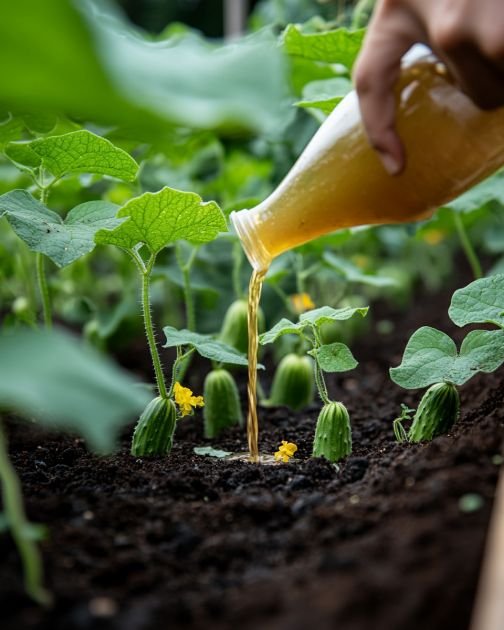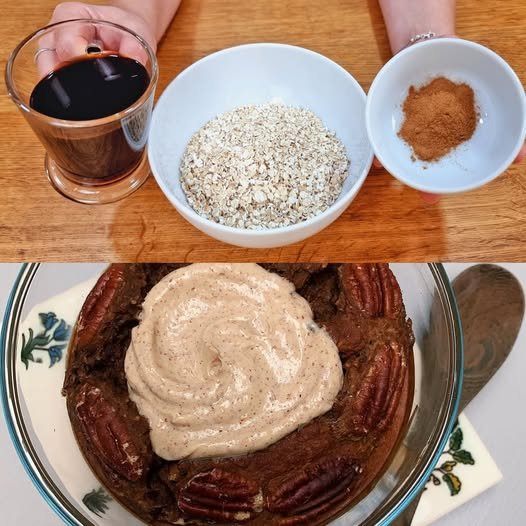In the heart of summer, when gardens are in full bloom, there’s nothing quite like the satisfaction of seeing your cucumbers thrive. For many gardeners, achieving this lush growth can be a challenge, but my neighbor seems to have cracked the code. Her cucumbers are the envy of the neighborhood, and after much curiosity, I discovered her secret: a special compost tea recipe.
Compost tea is a liquid solution made from steeping compost in water, and it’s revered by gardeners for its ability to boost plant health and yield. My neighbor’s version, however, seems to have an extra touch of magic. In this article, I’ll share her secret recipe and explain why it works so well, so you too can enjoy a bountiful cucumber harvest this summer.
1. Discovering the Secret: A Neighbor’s Green Thumb
It all started with a casual conversation over the fence. I complimented my neighbor on her thriving cucumber plants, and she graciously shared her secret: a homemade compost tea. She explained that she had been perfecting the recipe over the years, tweaking ingredients and timing until she found the perfect balance.
Her enthusiasm was infectious, and she invited me to see her process firsthand. She showed me her compost bin, filled with rich, dark organic matter, and explained how she carefully selects the ingredients for her tea. She uses a mix of kitchen scraps, garden waste, and a few special additions that she swears by. The key, she said, is in the brewing process and the precise timing of application.
2. What Is Compost Tea and Why It Works
Compost tea is essentially a nutrient-rich liquid fertilizer that is created by steeping compost in water. The process extracts beneficial microorganisms and nutrients from the compost, creating a solution that can be easily absorbed by plants. This liquid gold is packed with bacteria, fungi, protozoa, and nematodes, all of which contribute to healthy soil and robust plant growth.
When applied to plants, compost tea enhances nutrient uptake, improves soil structure, and boosts plant immunity against diseases. It’s a natural way to provide plants with the essential nutrients they need without the use of chemical fertilizers. The microorganisms in the tea also help break down organic matter in the soil, making nutrients more available to plants.
3. Key Ingredients for the Perfect Brew
My neighbor’s compost tea recipe includes a few key ingredients that set it apart. She starts with high-quality compost, which she makes from a mix of vegetable scraps, grass clippings, and dried leaves. To this, she adds a handful of worm castings, which are rich in nutrients and beneficial microbes.
She also includes a tablespoon of unsulfured molasses, which acts as a food source for the microbes, helping them multiply. Additionally, she adds a small amount of fish emulsion, which provides extra nitrogen and other essential nutrients. Finally, she includes a teaspoon of kelp meal, which is rich in trace minerals and growth hormones.
4. The Brewing Process: Step-by-Step Guide
To brew her compost tea, my neighbor follows a precise process. She starts by filling a 5-gallon bucket with water and letting it sit for 24 hours to allow any chlorine to evaporate. Then, she adds about 2 cups of compost, a handful of worm castings, and the other ingredients.
She uses an aquarium pump to aerate the mixture, which keeps the microbes alive and active. The tea is brewed for 24 to 48 hours, during which time the water becomes a rich, dark color. Once the brewing is complete, she strains the tea through a fine mesh to remove any solid particles, leaving a nutrient-rich liquid ready for application.
5. Timing Is Everything: When to Apply Compost Tea
Timing is crucial when it comes to applying compost tea. My neighbor advises applying it early in the morning or late in the afternoon, when the sun is not too intense. This helps prevent the tea from evaporating too quickly and allows the plants to absorb the nutrients more effectively.
She applies the tea every two weeks during the growing season, starting in early spring when the plants are just beginning to grow. This regular application ensures that the plants receive a steady supply of nutrients, promoting healthy growth and abundant yields.
6. The Science Behind Thriving Cucumbers
Cucumbers are heavy feeders, meaning they require a lot of nutrients to grow well. Compost tea provides a balanced supply of nitrogen, phosphorus, and potassium, as well as trace minerals that are essential for plant health. The beneficial microbes in the tea also help suppress soil-borne diseases, which can be a common problem for cucumbers.
The increased microbial activity in the soil improves nutrient availability and uptake, leading to stronger, healthier plants. This, in turn, results in more vigorous growth and higher yields. The natural growth hormones in the kelp meal also contribute to larger, more robust cucumbers.
7. Common Mistakes to Avoid When Making Compost Tea
One common mistake is using chlorinated water, which can kill the beneficial microbes in the compost tea. Always let tap water sit for 24 hours before using it, or use rainwater if possible. Another mistake is not aerating the tea properly. Without sufficient oxygen, the tea can become anaerobic, leading to the growth of harmful bacteria.
It’s also important not to over-brew the tea. Brewing for more than 48 hours can lead to a decline in microbial activity. Finally, avoid applying the tea during the hottest part of the day, as this can cause the tea to evaporate quickly and reduce its effectiveness.
8. Popular Viral Hacks to Enhance Compost Tea
Some gardeners swear by adding a few drops of liquid seaweed extract to their compost tea for an extra nutrient boost. Others recommend using a small amount of humic acid to improve nutrient uptake. Another popular hack is to add a few crushed eggshells to the compost bin, which can increase the calcium content of the tea.
There are also those who experiment with adding brewed coffee grounds or leftover tea leaves to their compost, claiming that the caffeine and tannins can stimulate plant growth. While these hacks can be fun to try, it’s important to remember that the basic principles of compost tea should remain the same.
9. How Compost Tea Benefits Your Entire Garden
While my neighbor’s compost tea is particularly effective for cucumbers, it can benefit the entire garden. The nutrients and beneficial microbes in the tea improve soil health, leading to healthier plants overall. This can result in more vibrant flowers, stronger root systems, and increased resistance to pests and diseases.
Compost tea can also help improve the soil structure, making it easier for plants to take up water and nutrients. This is especially beneficial in sandy or clay soils, where nutrient availability can be a challenge. By regularly applying compost tea, gardeners can create a thriving ecosystem in their gardens.
10. Testimonials: Success Stories from Fellow Gardeners
After trying my neighbor’s compost tea recipe, I was amazed at the results. My cucumbers grew larger and more plentiful than ever before, and the plants seemed healthier overall. I shared the recipe with a few gardening friends, and they too reported impressive results.
One friend noted that her tomato plants, which had been struggling, suddenly took off after she started using the tea. Another gardener found that her roses bloomed more profusely and with richer colors. These success stories are a testament to the power of compost tea and its ability to transform a garden.
11. Tips for Sharing and Spreading the Green Love
If you’ve experienced success with compost tea, consider sharing the recipe with fellow gardeners. Host a garden party and demonstrate the brewing process, or share your story on social media to inspire others. You can also join local gardening clubs or online forums to connect with like-minded individuals.
By spreading the word about compost tea, you can help others achieve the same success in their gardens. Not only does this foster a sense of community, but it also promotes sustainable gardening practices that benefit the environment. Together, we can all enjoy the rewards of a thriving, bountiful garden.



